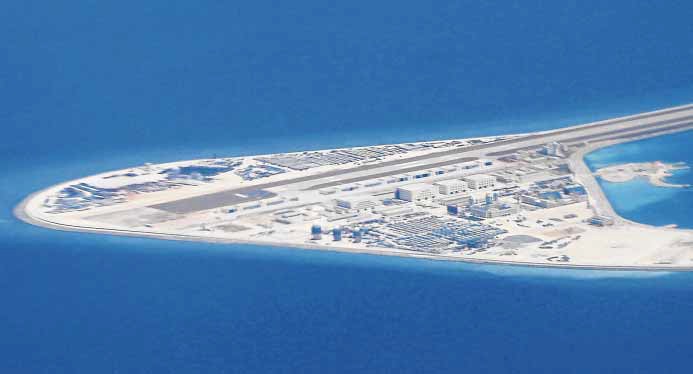
THREAT TO FREEDOM OF NAVIGATION: This July 12, 2017 file photo, taken from a Philippine Air Force C-130 transport plane, shows Chinese structures and an airstrip on Zamora Reef that are considered a threat to freedom of navigation in the West Philippine Sea. —AP
MANILA — What is the point of no return for the Philippines in its maritime dispute with China in the South China Sea?
With the about-face policy of Duterte administration a year after the country’s victory in the Permanent Court of Arbitration (PCA), the point of no return for the Philippines will range from the environmental degradation and militarization in the South China Sea to China’s exhaustion of all economic benefits, according to experts.
University of the Philippines (UP) professor Jay Batongbacal said on Wednesday, the Philippines has been moving towards an irreversible situation concerning the environment and China’s militarization in the South China Sea.
“For the environment, the point of no return is the collapse of the natural resources particularly the coral reefs and fishes. There is data indicating that we are approaching this point in the South China Sea,” Batongbacal said at a forum organized by the ADR Institute led by former Foreign Affairs Secretary Albert del Rosario to mark the first anniversary of the Philippine victory in the Permanent Court of Arbitration in The Hague.
Batongbacal, the director of the UP Institute for Maritime Affairs and Law of the Seas, said that “with respect to militarization, we are rapidly reaching that point.”
“I think the only thing left for the island [building of China] is the activation of the defenses and the basing of actual assets,” he said.
Batongbacal said “jurisdiction will follow after those two.”
“If we are no longer able to have our fishermen fish freely, and our [government forces] are no longer able to effectively operate in that area… then that would mean we have passed the point of no return,” Batongbacal said.
Supreme Court Associate Justice Antonio Carpio and former National Security Adviser (NSA) Roilo Golez both said the Philippines should be careful not to waive its sovereign rights and jurisdiction in the South China Sea.
“If the present administration will waive our sovereign rights and jurisdiction, that is the point of no return… Under international law, we cannot lose our sovereign rights due to unlawful actions of other states,” Carpio said.
According to Golez, the “dynamics of geopolitics and geostrategy” are reasons why there is unlikely to be a point of no return. Moreover, Golez said, “the situation might change” after five years, referring to the remaining period of the Duterte administration.
But Carpio added that the Philippines might lose the economic benefits of its sovereign rights if Beijing took Scarborough Shoal to complete its capability to physically control the South China Sea and “exhaust” the oil, gas, and other natural resources.
“The option is do we want $24 billion or do we want the West Philippine Sea?” Carpio said, referring to Beijing’s investment pledges secured by the Duterte administration. The value of the resources in the sea is seven times the value of the resources on land as assessed by experts, according to Carpio.
“I am sure the value of the resources of the WPS is much much higher than US $24 billion,” Carpio said.
Carpio added that China signing a Code of Conduct (COC) would be “a case of good news and bad news.”
“When China says it is ready to sign the COC, it is of course good news. But at the same time it is also bad news because it means China will soon reclaim Scarborough Shoal since China will sign the COC only after it completes its radar and anti-aircraft missile coverage of the South China Sea,” he said. SFM